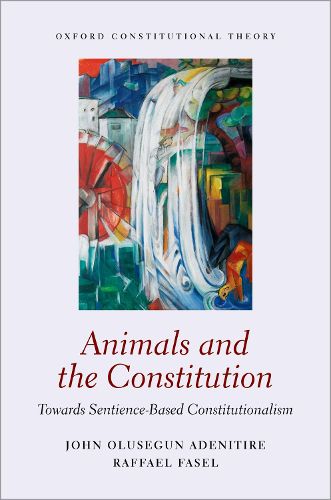Readings Newsletter
Become a Readings Member to make your shopping experience even easier.
Sign in or sign up for free!
You’re not far away from qualifying for FREE standard shipping within Australia
You’ve qualified for FREE standard shipping within Australia
The cart is loading…






ConstitutionalismDLthe idea that constitutions should limit and direct government powerDLhas emerged as the global standard for the exercise of public authority. Its appeal lies in the simple idea that constitutions should secure governance in the interests of the governed. Yet, its popularity has obscured a significant problem: constitutions are centred on the interests of rational human beings, neglecting those who lack such capacitiesDLmost notably, non-human animals. Animals and the Constitution breaks new ground by challenging the human-centredness of current constitutional theory and practices. It pioneers a more capacious account of constitutionalismDLsentience-based constitutionalismDL which is grounded in respect for the interests of all governed sentient beings. The book demonstrates how this account can be implemented in modern constitutions by rethinking four key principles of constitutionalism: constitutional rights, proportionality, the rule of law, and democracy. To illustrate how these principles can be reimagined to protect the interests of both humans and animals, the book draws on and examines numerous real-world examples, ranging from judicial recognitions of wild animals rights in Ecuador, to direct-democratic votes on primates rights in Switzerland, to entire proposed bills of rights for animals in Finland. A unique combination of constitutional theory, animal ethics, and comparative constitutional law, this book offers a practical blueprint for constitutions to address the moral and legal status of sentient beings.
$9.00 standard shipping within Australia
FREE standard shipping within Australia for orders over $100.00
Express & International shipping calculated at checkout
ConstitutionalismDLthe idea that constitutions should limit and direct government powerDLhas emerged as the global standard for the exercise of public authority. Its appeal lies in the simple idea that constitutions should secure governance in the interests of the governed. Yet, its popularity has obscured a significant problem: constitutions are centred on the interests of rational human beings, neglecting those who lack such capacitiesDLmost notably, non-human animals. Animals and the Constitution breaks new ground by challenging the human-centredness of current constitutional theory and practices. It pioneers a more capacious account of constitutionalismDLsentience-based constitutionalismDL which is grounded in respect for the interests of all governed sentient beings. The book demonstrates how this account can be implemented in modern constitutions by rethinking four key principles of constitutionalism: constitutional rights, proportionality, the rule of law, and democracy. To illustrate how these principles can be reimagined to protect the interests of both humans and animals, the book draws on and examines numerous real-world examples, ranging from judicial recognitions of wild animals rights in Ecuador, to direct-democratic votes on primates rights in Switzerland, to entire proposed bills of rights for animals in Finland. A unique combination of constitutional theory, animal ethics, and comparative constitutional law, this book offers a practical blueprint for constitutions to address the moral and legal status of sentient beings.